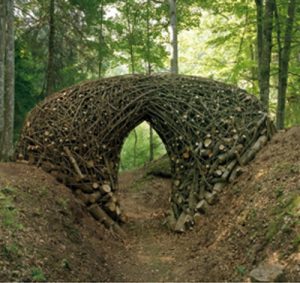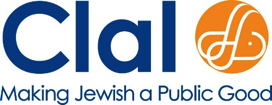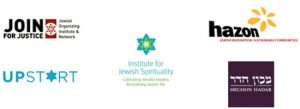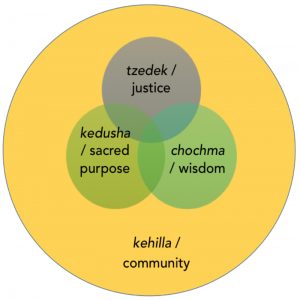Kenissa
A Training for Leaders of Emergent Jewish Communities
a project of
New Paradigm Spiritual Communities Initiative
December 4-6, 2016
Pearlstone Center, Reisterstown MD
Co-Sponsoring Organizations:
Kenissa is funded by grants from the William Davidson Foundation, William and Audrey Farber Family Foundation and Lippman Kanfer Foundation for Living Torah.
Kenissa, the Hebrew word for entrance-way, will open pathways to a more robust model of spiritual community, harnessing the wisdom and gifts of the NPSCI network and building capacity for the work of the individuals and organizations in the NPSCI network.
Goals of Kenissa
- Deepen INTEGRATION & INTERCONNECTEDNESS between chochma, kedusha, tzedek and kehilla.
- Leverage skills and knowledge in the community by engaging as TEACHERS & LEARNERS
- Help participants create more robust “covenantal” communities that better ENGAGE constituencies.
Core Components
- WORKSHOP SESSIONS that originate from one sector in the Venn diagram (below), with explicit purpose of creating a “portal” for those who are more rooted in another sector.
- APPLICATION GROUPS to help participants to make explicit connections to their work back home in a repeated, structured peer experience.
- SKILL BUILDING to deepen learning around covenantal community and putting results at the center.
- SHARED EXPERIENCE and MINDFULNESS as both community building and modeling. Morning practice and shared mindfulness practice offered to help participants connect to their wisdom and deepen the impact of the training itself.
Kenissa Working Group
DEEP GRATITUDE to the members of the Kenissa Working Group. Our monthly meetings – across five time zones – were full of wisdom, engaged deliberation and genuine camaraderie.
- Blair Nosan
- David Jaffe
- Dove Kent
- Larry Yermack
- Rabbi Lisa Goldstein
- Ilana Sumka
- Jacob Fine
- Nati Passow
- Rabbi Sid Schwarz
[NOTE: Full group programming takes place in Beit Midrash; workshop spaces listed accordingly.]
SUNDAY DECEMBER 4, 2016
2 pm WELCOME and CONTEXT
Introductions; Orientation to NPSCI; Overview of Kenissa
APPLICATION GROUPS
Sharing context, “What We Do Best,” and setting goals for the training
4 pm SESSION #1: CHOCHMA/WISDOM
Jewish Sensibilities for Personal and Social Transformation
Lee Moore, Lippman Kanfer Foundation for Living Torah — Vineyard
Jewish sensibilities, like ‘gerim haitem/we were strangers’ and ‘elu v’elu/ a both/and perspective are useful starting points to have a conversation about Jewish approaches to personal relevance and effective social change. In this workshop, we will explore ways to use the framework and a set of new tools (card deck, curriculum and ready-made sefaria pages) to weave Jewish wisdom into our work and social contexts.
Making Torah Your Own
David Jaffe, The Kirva Institute — Orchard
For many people Torah is intriguing, alienating, mysterious, foreign, an object of desire or all of the above. There are many barriers to accessing the wisdom embedded in Torah. This session will help each participant find their own unique portal for entry into the world of Torah.
6 pm DINNER
7:15 pm SUSTAINING THE WORK, SUSTAINING THE SELF
Shared Practice
Storytelling around sustaining the work while sustaining ourselves, starting with Jakir Manela, Shawn Zevit and Claudia Horwitz, followed by storytelling in small groups.
MONDAY DECEMBER 5, 2016
7 am MORNING GATHERING: TRADITIONAL
Led by Justin David, Congregation B’nai Israel, Northampton, MA.
Hebrew morning prayers incorporating melodies, niggunim and spacious silence.
Participants are encouraged to self-organize additional morning gathering opportunities as desired.
8 am BREAKFAST
9 am SESSION #2: KEDUSHA/SACRED PURPOSE
For the Sake of Heaven: Healing, Conflict and Building Sacred Community
Shawn Zevit, Mishkan Shalom — Vineyard
In this interactive session we will combine experiential exercises, text study, discussion, reflection, individual and small group work as we explore the rich Jewish tradition around dealing with differences and opening to healing as part of the natural course of community building. Understanding ourselves as leaders when we find ourselves in conflict as well as holding the space for each other and our communities and organizations (whether in formation or well-established) is an integral part of being agents of change and holy transformation.
Mindfulness: A Tool for Social Justice
Larry Yermack + Beth Sandweiss, Institute for Jewish Spirituality — Orchard
Mindfulness is simple—we breathe, we sit. We open the mind’s clenched fist. Emotional resilience is crucial to any great social movement, allowing change-makers to mirror what we hope to bring to the world: peace, justice, and relief from suffering. Mindfulness meditation allows us to come in contact with the full potential of the human heart. We will explore practices that help us stay balanced and open, even in the face of anger, fear and other difficult emotional states. By training our mind and heart and directing compassion toward ourselves and others we find that, far from making ourselves more vulnerable, we find that we are better able to take skillful and effective action.
11 am RESULTS AT THE CENTER
Shared Practice
Skill-building on Results at the Center, including Application Groups – Claudia Horwitz
12:30 pm LUNCH and BREAK
2:00 pm SESSION #3: TZEDEK/SOCIAL JUSTICE
Building Movements that Last and Succeed
Meir Lakein, JOIN for Justice — Vineyard
It’s hard not to succumb to the temptation to mimic past movements, but that’s a losing cause. We had a giant, passionate march – why didn’t it move mountains as the March on Washington did? People were so engaged with our text study – why didn’t they run out to start a new Jewish movement the way that we’ve heard happened before? It’s easy to focus on the trappings of a movement rather than digging into the elements that smart, sustainable movements have in common – a common narrative that reflects common values, a sense of urgency, an ability to penetrate and navigate social networks, and a campaign focused on action rather than programs. In this session, we will dig into these four principles, learn from how we’ve used them in the past, and workshop how we might use them to build movements around our current goals. People may have noticed that there was an election earlier this month – some people may want to use this opportunity to workshop how they hope to mobilize their constituents in the months ahead.
Co-Conspiring for a Just World: How Do We Work in Partnership and Solidarity?
Dove Kent + Yehudah Webster, Jewish for Racial and Economic Justice — Orchard
We know that to create the world we need we have to work in deep partnership across lines of difference. And yet, this work often comes with so many pitfalls that many of us retreat into our own identity groups and work in isolation, or with shallow levels of allyship. This workshop will be an opportunity to dig into the challenges that keep our communities from being in sacred covenant together. Participants will gain tools to be active co-conspirators for a just world in which all of us thrive.
4:00 pm COMMUNAL CULTURE OF ACCOUNTABILITY AND SUPPORT
Strategies for Building Communal Culture – Rabbi Sid Schwarz
Q and A
Home Teams
5:30 pm BREAK
6:30 pm DINNER
7:30 pm EVENING PROGRAM: WHERE DO WE GO FROM HERE?
Led by Nati Passow and Sarra Alpert
The outcome of the 2016 election has ramifications for every corner of our world and our work – as Jews, as activists, as teachers, as spiritual beings and leaders. How will the results impact our work and strategies, and how do we navigate the complex reality, paradox, challenge, and opportunity of this moment?
TUESDAY DEC 6
7 am MORNING GATHERING: ALTERNATIVE
Led by David Jaffe, The Kirva Institute
Turning Torah into Prayer, a classic Breslov Hassidic practice that connects head learning with the heart.
Participants are encouraged to self-organize additional morning gathering opportunities as desired.
8 am BREAKFAST
9 am SESSION #4: KEHILLAH / COVENANTAL COMMUNITY
Building Community Across Spiritual and Political Lines
Zahara Zahav, The Kirva Institute — Vineyard
Many in this moment are reflecting upon the effects on ourselves, our work, and our society when we don’t effectively and meaningfully build community across political and spiritual lines. In this session, we’ll explore together how building across these lines can make us better and more powerful, and what we lose when we don’t. We’ll generate ideas and tools for building such communities and workshop applying these to some specific lines of difference in the Jewish community.
Community Building Principles and Practices You Can Use (Gleaned from 20+ Years of Synagogue Transformation)
Rob Weinberg , Experiment in Congregational Education, HUC-JIR — Orchard
Through this session, participants will both experience and unpack community-building practices developed through synagogue transformation efforts like the Experiment in Congregational Education, Synagogue 2000/3000, and Connected Congregations. You’ll take away community-building principles, practices, and tools that you can apply personally and in your community.
11 am CLOSING SESSION
Shared Practice, integrating the learning
Action Commitments, moving forward and closing
12:30 pm LUNCH and DEPARTURE
The New Paradigm Spiritual Communities Initiative
For generations, Jews have thought of synagogues as the institution that nurtured their religious and spiritual lives. But as growing percentages of people describe themselves as “spiritual but not religious”, synagogues that do not nourish souls are suffering from a loss of relevance and declining membership numbers. This is happening at a time when trends in American society (e.g. effects of internet culture, the erosion of social capital, partisanship replacing the “public square”), are making the need for spiritual community greater than ever before.
American Jewish life is in a time of transition that calls for bold, new thinking and the development of new models for identification. Membership and affiliation patterns that have sustained synagogues and other legacy Jewish institutions for more than a century are eroding. At the same time we see a dramatic growth of interest and energy in new expressions of Jewish community. Some are focused on learning. Some are focused on social justice. Some are focused on contemplative practice and spirituality. Some are focused on food and environmental sustainability. Some are focused on prayer. Some look like synagogues; some do not. Each sector has seen one or more organizations emerge that have either seeded the phenomenon or have created a network to sustain and support the phenomenon.
What the sectors have in common is that they utilize a particular idiom unique to contemporary American culture that attracts other Jews with similar interests. The richness of the Jewish heritage is literally being re-invented in our time by the way in which Jewish wisdom is being applied to the challenges that confront our world today. If properly nurtured and encouraged, these “communities of meaning” can form the nucleus of an American Jewish renaissance. Communities of meaning are networks of individuals that are inspired by an idea or a practice that enrich the lives of participants and/or significantly improve conditions in the world for others.
The New Paradigm Spiritual Communities Initiative (NPSCI) is a forum where the people leading contemporary efforts to re-define Jewish life and community for themselves can come together, learn from each other and be supported in their efforts to create communities of meaning. At annual Consultations every March, NPSCI will gather 50-60 individuals whose work and/or thinking can advance an understanding of this phenomenon from many different sectors of the Jewish world. Participants will benefit from seeing their particular endeavors in the context of a changing socio-political landscape and a rapidly changing Jewish community. There will also be participation from significant thinkers and practitioners beyond the Jewish world that will enrich and broaden our conversation. A weekly blog intended to provide thought leadership to this emerging trend is being hosted on our website at http://www.npsci.org/. Every December, NPSCI will host Kenissa: A Training for Leaders of Emergent Jewish Communities. Any participant of a NPSCI Consultation will be able to bring a team from their organizations to be part of this capacity building effort.
NPSCI is sponsored by Clal as part of its mission to see Jewish as a public good. Over the course of the next five years we intend to build and collect a body of knowledge and broaden the universe of participants. It will eventually incorporate thinkers and practitioners from other faith communities in America. The Initiative is being led by Rabbi Sid Schwarz, senior fellow at Clal and the author of, among other books, Jewish Megatrends: Charting the Course of the American Jewish Community. Co-sponsors of the Initiative are Hazon, the Institute for Jewish Spirituality, JOIN for Justice, Mechon Hadar and UpStart.
The New Paradigm Spiritual Communities Initiative is being supported by lead funding from the William Davidson Foundation. Additional support is provided by the William and Audrey Farber Family Foundation and Lippman Kanfer Foundation for Living Torah.
NPSCI Venn Diagram: Integrating Tzedek, Chochma and Kedusha in the context of Kehilla.
NPSCI supports the development of spiritual communities that:
use the wisdom and practice of Judaism (chochma)
to help people live lives of sacred purpose (kedusha) and
inspire people to contribute to a more just and peaceful world (tzedek).
The context for the work is covenantal community (kehillot) where a group of people intentionally enter into a mutual and accountable relationship focused on a common mission.





